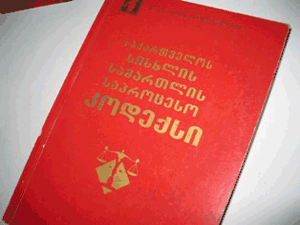 Nona Suvariani, Tbilisi
Nona Suvariani, Tbilisi
The article of the law that contradicts with the Georgian Constitution and international conventions makes people to pay fines even for offenses they have not committed.
Article 42, Part V' of the Georgian Criminal Code: “If the convicted person is juvenile or incapable to pay the fine, the court imposes the fine on his/her parent, guardian or caretaker”
(The amendment # 4213 was introduced on December 29 2006). The Public Defender states that the article contradicts general resolutions of the Georgian Constitution and Article 7 of the European Convention. Thus, the ombudsman has appealed the law before the Constitutional Court immediately after it was passed.
Meri Maghlaperidze, the head of the Center for the Child’s Rights within the Public Defender’s Office, spoke about the principles of international law, and based on practice of the international law a person should not be charged without legal proceedings.
“This is the principle stipulated by the Article 7 of the European Convention and according to it, nobody shall be punished for the behavior that was not considered to be crime at the moment it happened. The principle also envisages that a person cannot be persecuted for the behavior that is not envisaged as a crime by the law. The person must necessarily have some connection with the alleged crime that was committed.”
According to the Article 42, a juvenile at the age of 14 to 18 (the criminal liability starts at the age of 12 according to the new law, though not enacted yet) who has independently committed the crime envisaged under the criminal code will be fined. If s/he cannot pay the fine, his/her parent shall be fined in lieu. A fine represents the penalty for having been responsible for a crime. Consequently, the parent who is not guilty for the crime is being charged with the offence, which is violation of the law.
“The court imposes a liability on a person together with the corresponding certificate on guiltiness. Only that person shall be charged who committed the crime. The principle of the criminal code is well-known as principle of crime individualism (nulla poena sine culpa).
Although crime individualism is not declared in Georgian Constitution, Article 39 of the Georgian Constitution states: “Georgian Constitution also envisages all universal human rights, basic freedoms and guarantees that are not mentioned here but are obvious based on constitution principle,” stated the suit of the Public Defender submitted to the Georgian Constitutional Court.
Meri Maghlaperidze states that the principle is expressed in the decision of the Constitutional Court.
“In the past the court abolished property confiscation because it damaged not only the criminal but also innocent members of his/her family; and that is referred to as the principle of crime individualism. The charge should be imposed only on actual offender. There is not a separate article in the Constitution that contradicts with the new article of the law. Generally, the controversy is in the principles of the Article 40 and even Article 42 of the Constitution. The most important issue is that it contradicts with the Article 39 of the constitution that envisages universal human rights and freedoms that are not mentioned in the constitution though prefigured in the constitution.”
Although the ombudsman’s office appealed against the norm a year ago, no changes have yet been introduced. Parents or guardians are paying fines for crimes that they have not committed. The minimal sum of the fine is 2,000 GEL. The court can use a fine as a means of punishment at any time. However, if the fine is directly envisaged in the article, it might be used as the means of applying the main liability.



